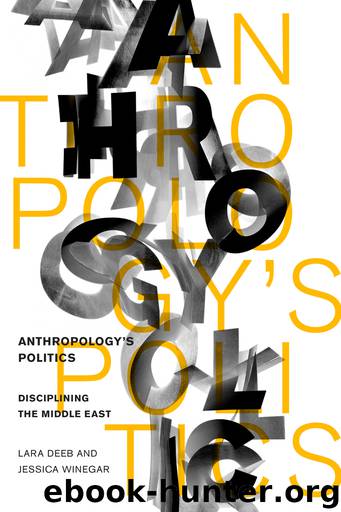Anthropology's Politics by Deeb Lara Winegar Jessica

Author:Deeb, Lara,Winegar, Jessica [Deeb, Lara]
Language: eng
Format: epub
Publisher: Stanford University Press
Published: 2015-04-14T16:00:00+00:00
5
Dis/Engaging the War on Terror
In March 2003, the United States spearheaded a massive military invasion of Iraq based on lies that then-President Saddam Hussein had weapons of mass destruction (WMDs) and was linked to al-Qaeda. Most Middle East experts immediately knew that the latter claim was preposterous, and within a couple of months we learned that the WMD intelligence was faulty as well. What was the cost of this invasion and consequent war and occupation built entirely on lies? Nearly half a million dead Iraqis. The virtual destruction of Iraqi society, including historical sites and material culture.1 Almost five thousand dead US and allied soldiers. And thousands in Iraq and the United States living with permanent mental and physical injuries. One might expect that anthropologists, given their oft-stated commitment to support human cultural diversity and their robust critiques of colonialism and imperialism, would have been opposed to—if not outraged by—this war from its beginning. Many were. But in spring 2004, the leadership of their representative institution, the American Anthropological Association (AAA), explicitly refused to issue a public statement condemning the war.
Over the next few years both the AAA and its Middle East Section were slow to respond to the War on Terror and the shifting US political climate it fomented. Indeed, at the very moment when many MENA anthropologists’ fieldsites were being pulled into a politicized spotlight and our research interlocutors deemed “the enemy” by the US government, the section representing these anthropologists in the AAA took an explicit step away from political advocacy. And AAA attentions more broadly were turned everywhere but toward the war in its national midst.
How did this happen? How did the discipline that often prides itself on caring for human society and speaking truth to power not respond quickly and forcefully to condemn US empire and its vast destruction of human life? Much of the answer lies in the historical tensions at the discipline’s core: tensions over taking collective and public political positions, defining anthropological relevance and expertise, working (secretly or not) for the government’s defense and intelligence agencies, and prioritizing protecting anthropologists over their research interlocutors. It also lies in processes of institutionalization; persistent hierarchies of gender, race, and generation; and the historical treatment of MENA as an exception in anthropology—especially through the lens of compulsory Zionism.
All these factors shaped disciplinary engagements with the War on Terror and Israel-Palestine politics in the twenty-first century. The AAA struggled to steer a course for anthropology as the war spread, overtly and covertly, across the globe and within the United States, resulting in skyrocketing deaths, detentions, imprisonments, incidents of torture, and oppressive surveillance and securitization. The association refused to act in response to complaints that most Middle Eastern and/or Muslim noncitizen adult males in the United States were subjected to special registration and profiled in extra security measures on the streets and at airports. Debates raged over whether and how anthropologists should participate in the war effort, especially as they were increasingly sought out by the US government, including the military and the CIA.
Download
This site does not store any files on its server. We only index and link to content provided by other sites. Please contact the content providers to delete copyright contents if any and email us, we'll remove relevant links or contents immediately.
| Anthropology | Archaeology |
| Philosophy | Politics & Government |
| Social Sciences | Sociology |
| Women's Studies |
Nudge - Improving Decisions about Health, Wealth, and Happiness by Thaler Sunstein(7691)
The Fire Next Time by James Baldwin(5431)
iGen by Jean M. Twenge(5408)
Adulting by Kelly Williams Brown(4565)
The Sports Rules Book by Human Kinetics(4379)
The Hacking of the American Mind by Robert H. Lustig(4375)
The Ethical Slut by Janet W. Hardy(4242)
Captivate by Vanessa Van Edwards(3838)
Mummy Knew by Lisa James(3686)
In a Sunburned Country by Bill Bryson(3536)
The Worm at the Core by Sheldon Solomon(3485)
Ants Among Elephants by Sujatha Gidla(3460)
The 48 laws of power by Robert Greene & Joost Elffers(3244)
Suicide: A Study in Sociology by Emile Durkheim(3017)
The Slow Fix: Solve Problems, Work Smarter, and Live Better In a World Addicted to Speed by Carl Honore(3007)
The Tipping Point by Malcolm Gladwell(2914)
Humans of New York by Brandon Stanton(2868)
Handbook of Forensic Sociology and Psychology by Stephen J. Morewitz & Mark L. Goldstein(2692)
The Happy Hooker by Xaviera Hollander(2686)
